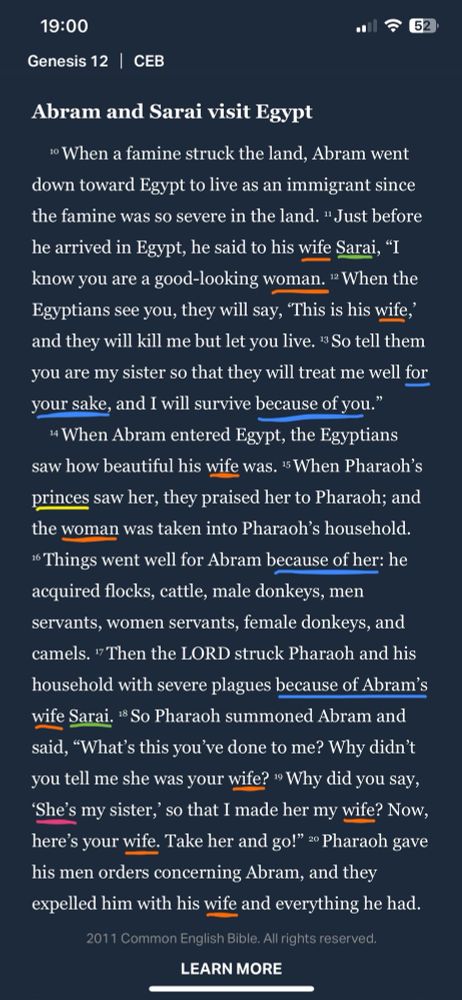
I’m trying to stash some sources for the day I write the introduction of my dissertation and this would be a great addition.
This book is “Ecology and Theology of Nature,” edited by Hogan, Vila-Chã, and Orobator

I’m trying to stash some sources for the day I write the introduction of my dissertation and this would be a great addition.
This book is “Ecology and Theology of Nature,” edited by Hogan, Vila-Chã, and Orobator






Here, the text turns the story on its head.
Now, Abram is not benefiting on Sarai’s account, *she* is. God’s vengeance is for her sake.


Here, the text turns the story on its head.
Now, Abram is not benefiting on Sarai’s account, *she* is. God’s vengeance is for her sake.
This is SO CLOSE TO SAYING HER NAME that the difference is in ONE VOWEL.


This is SO CLOSE TO SAYING HER NAME that the difference is in ONE VOWEL.
But their consonants are those of the 3MS pronoun, which would be “he/him.”
The Masoretes provide the vowels for the 3FS pronoun so that we know it should be read as “she/her” referring to Sarai.


But their consonants are those of the 3MS pronoun, which would be “he/him.”
The Masoretes provide the vowels for the 3FS pronoun so that we know it should be read as “she/her” referring to Sarai.
Compare this to the green, which shows where her name is used.
Sarai is referred to as “wife/woman” 10x & only called by her name twice, neither time by another character—only by the narrator


Compare this to the green, which shows where her name is used.
Sarai is referred to as “wife/woman” 10x & only called by her name twice, neither time by another character—only by the narrator
All but one (v. 17) refer to Abram benefiting from Sarai marrying Pharaoh. We’ll come back to this.


All but one (v. 17) refer to Abram benefiting from Sarai marrying Pharaoh. We’ll come back to this.
And sadly, hers is a story we hear too often: men prosper on account of the women they’ve hurt, tucked neatly away, and silenced.
The Hebrew portrays this dynamic so vividly!


And sadly, hers is a story we hear too often: men prosper on account of the women they’ve hurt, tucked neatly away, and silenced.
The Hebrew portrays this dynamic so vividly!
If you read these verses outside of context, you’d think the psalm was about humanity!

If you read these verses outside of context, you’d think the psalm was about humanity!

